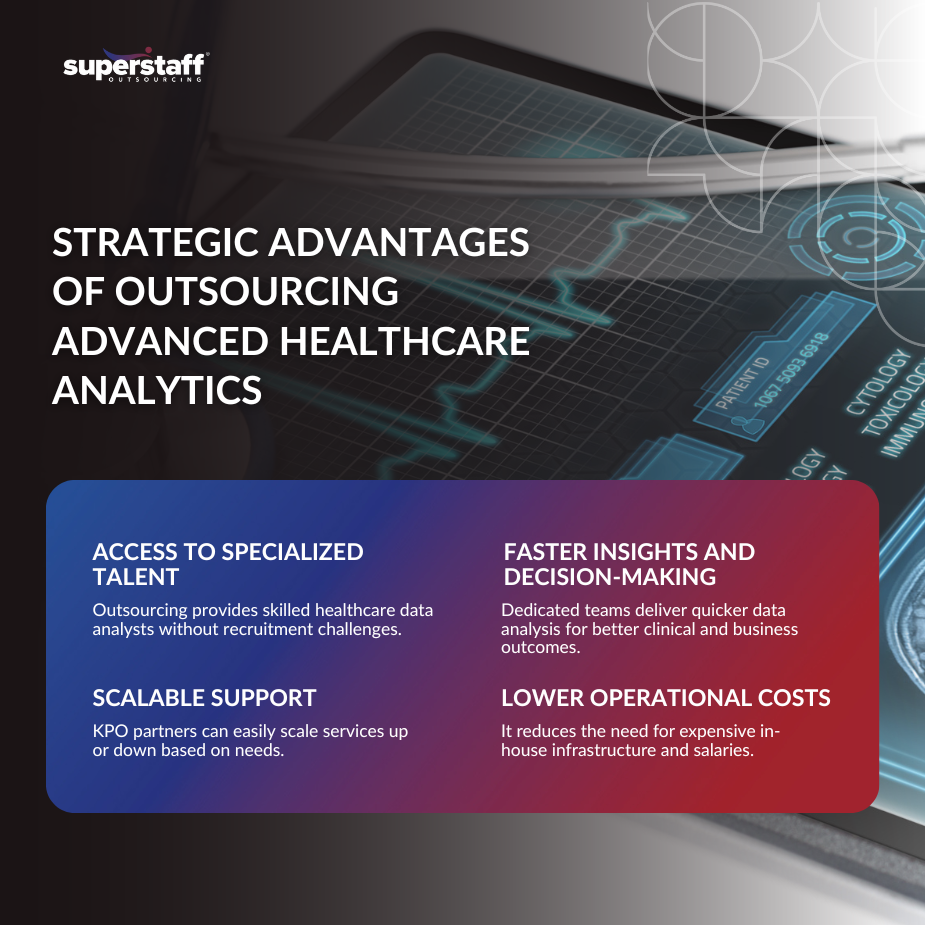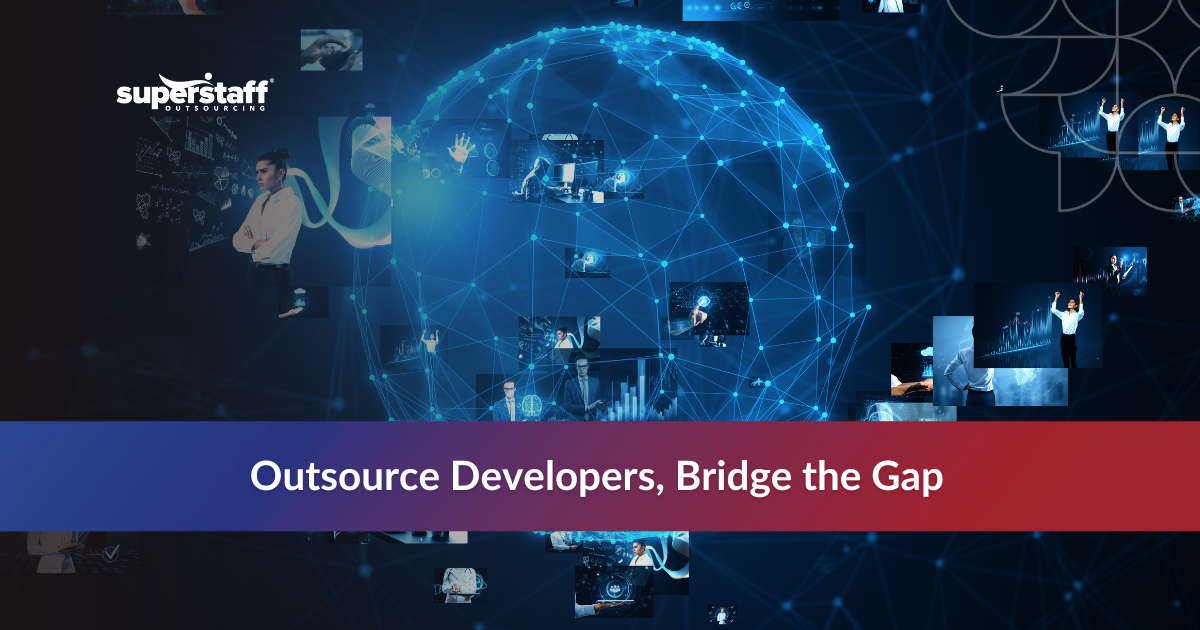
The demand for advanced healthcare analytics has skyrocketed as patient-centric care and data-driven decision-making become the new industry standards. From predicting patient risks to optimizing operational workflows, the ability to turn raw data into actionable insights is no longer a competitive advantage — it’s a necessity for survival.
Yet despite this urgent need, many healthcare organizations struggle to keep up. Building and maintaining a robust analytics function requires specialized talent, sophisticated tools, and continuous investments that many hospitals, insurers, and providers simply cannot sustain on their own. The volume, complexity, and sensitivity of healthcare data make in-house management even more challenging.
This is where Knowledge Process Outsourcing (KPO) solutions offer a powerful and strategic answer. By partnering with KPO providers that specialize in healthcare analytics, medical institutions can access world-class expertise, advanced technologies, and scalable support models without the need to develop these capabilities internally.
In this blog, we’ll explore how KPO services help healthcare organizations unlock the full potential of their data, driving better patient outcomes, boosting operational efficiency, and positioning institutions for long-term success in an increasingly data-driven world.
The Healthcare Industry’s Growing Dependence on Analytics
Across the healthcare sector, the shift toward predictive, personalized, and preventive care models is reshaping how organizations operate. It is no longer enough to react to health issues as they arise. Medical institutions are now expected to anticipate patient needs, personalize treatment pathways, and intervene early to prevent complications — all of which is made possible by data.
According to a recent report, the U.S. healthcare analytics market is poised for significant growth, projected to expand from $15.84 billion in 2024 to $47.40 billion by 2029, reflecting a compound annual growth rate (CAGR) of 24.5%.
At the heart of this transformation is the ability to interpret data in real time. Clinical decisions, administrative strategies, and resource allocations increasingly rely on immediate, evidence-based insights. Whether it’s monitoring patient vitals remotely, adjusting hospital staffing based on projected surges, or predicting the spread of chronic illnesses across populations, healthcare analytics play a central role in modern care delivery.
Population health management, for example, uses aggregated patient data to identify at-risk groups and proactively address health issues before they escalate. Meanwhile, risk-based insurance models depend on sophisticated analytics to assess individual health risks, calculate premiums, and manage care costs more effectively.
Yet many organizations face hurdles when building analytics capabilities internally.
The Talent and Technology Gap in Advanced Healthcare Analytics
Despite recognizing the importance of analytics, healthcare institutions often struggle to overcome a shortage of skilled data professionals. Data scientists and analysts with a deep understanding of healthcare systems, medical terminology, regulatory compliance, and clinical workflows are rare and in high demand.
Beyond the talent gap, the cost of maintaining in-house analytics infrastructure poses another challenge. Investing in servers, cybersecurity, machine learning tools, and interoperability solutions can strain budgets that are already stretched thin by the demands of patient care.
Complicating matters further are stringent regulatory requirements, such as the Health Insurance Portability and Accountability Act (HIPAA) in the United States and the General Data Protection Regulation (GDPR) in Europe. Healthcare data must be handled with utmost care, requiring not only technical expertise but also a deep understanding of legal frameworks to avoid costly breaches and fines.
Finally, integrating analytics with legacy electronic health record (EHR) systems and other outdated platforms can be both complex and costly. Many institutions are saddled with systems that were not designed with modern data analysis in mind.
This is where KPO solutions come into play, bridging the gap with expertise and scalability.

How KPO Solutions Empower Healthcare Organizations
Partnering with a healthcare-focused KPO provider enables organizations to sidestep these challenges. These specialized partners offer immediate access to highly trained healthcare data scientists and analysts who understand the unique demands of the industry.
Through healthcare business intelligence solutions, outsourced teams can assist with building advanced data models, creating interactive dashboards, and developing predictive analytics tools that help institutions spot patterns and trends before issues become critical. Their work powers two crucial areas:
- Clinical analytics for patient outcomes — supporting more accurate diagnoses, identifying gaps in care, and improving treatment protocols.
- Operational analytics for resource optimization — enabling hospitals and clinics to manage staffing, supply chains, and financial planning with greater precision.
Beyond technical expertise, KPO partners bring process rigor, industry best practices, and proven methodologies to the table, ensuring healthcare analytics projects are both innovative and compliant.
Beyond analytics expertise, KPO providers also bring operational advantages.
Scalability, Cost Efficiency, and Speed: The Strategic Advantages of KPO
Healthcare needs are dynamic. A spike in patient admissions, a public health emergency, or the introduction of a new insurance program can lead to sudden surges in data volume and complexity. KPO providers offer the scalability that healthcare institutions need, quickly ramping up or scaling down teams in response to real-time needs.
Financially, outsourcing healthcare analytics is often more cost-efficient than maintaining an in-house department. Institutions can access world-class expertise without the overhead of recruitment, training, infrastructure maintenance, and technology upgrades.
Speed is among the key benefits of outsourcing healthcare analytics to KPO firms. With dedicated teams focused exclusively on analytics, healthcare providers can achieve faster time-to-insight — a critical factor when lives and outcomes are at stake. Whether it’s identifying a rise in patient readmission rates or predicting equipment maintenance needs, quick access to actionable data translates into smarter decisions.
Flexible partnership models also enable organizations to tailor engagements to their specific needs, whether through short-term projects or long-term, full-time equivalents embedded within their operations.
While the benefits are clear, choosing the right KPO partner is crucial.
What to Look for in an Advanced Healthcare Analytics KPO Partner
Not all KPO providers are created equal. Healthcare organizations must be selective when choosing a partner to manage sensitive patient data and support critical decision-making processes.
Look for a KPO partner with industry-standard data security certifications, such as ISO 27001, and strict adherence to HIPAA compliance. These safeguards are non-negotiable when dealing with healthcare data.
Experience with healthcare-specific analytics platforms, including major electronic health record systems such as Epic and Cerner, as well as CRM solutions, is another essential requirement. Familiarity with these tools ensures smooth integration and faster project delivery.
Additionally, seek out a provider with a proven track record in advanced healthcare analytics. Request case studies, client references, and measurable results to evaluate their capabilities.
Finally, prioritize partners who offer transparent communication, detailed reporting, and collaborative working models. Healthcare analytics projects often require tight coordination between clinical staff, IT teams, and external providers — seamless collaboration is critical for success.
With the right partnership, healthcare institutions can future-proof their operations.
Healthcare’s Data-Driven Future Starts with the Right KPO Partner
As advanced healthcare analytics continues to shape the future of medicine, KPO solutions provide an indispensable lifeline for medical institutions striving to keep pace with the rapid pace of change.
By addressing talent shortages, reducing costs, improving scalability, and accelerating access to actionable insights, KPO providers empower healthcare organizations to focus on what matters most: delivering better outcomes for patients.
If your institution is ready to unlock the full power of healthcare data and stay ahead in a rapidly evolving industry, partnering with a trusted KPO provider is the strategic step forward.






